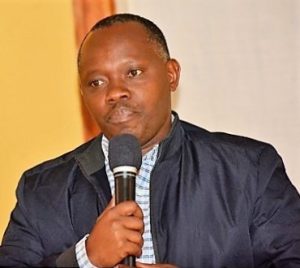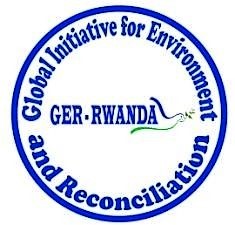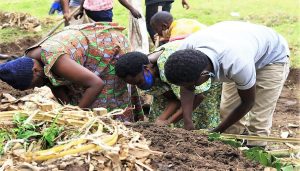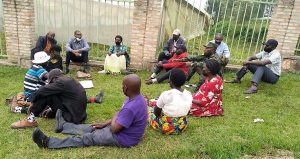As a peacebuilding and development organization operating in Rwanda and DRC in Eastern Kivu, GER-Global Initiative for Environment and Reconciliation supports post-conflict communities toward reconciliation and environmental protection. Its programs facilitate community knowledge exchange and intergenerational learning dialogues, with a focus on the next generation as an agent of change. As part of this, GER raises awareness in the promotion of agro-ecology and climate change adaptation, zero waste and pollution, by empowering communities on environmental issues and the use of local knowledge in environmental conservation, the proper use of natural resources and respect to the biodiversity with gender consideration. Find the story here as a first-hand snapshot on GER-Rwanda 2021 field engagement and practices
Improving Communities’ Livelihood, Healing and Reconciliation Rwanda
-
GER-Rwanda background
Since 2016, GER-Rwanda has been in collaboration with the African Biodiversity Network (ABN). Our work together and collaboration is contributing to promote agroecology in Rwanda and connecting people with nature. Our work focuses include; sustaining community-seed systems, reviving indigenous-seeds, community knowledge-exchange, bridging the knowledge-gap between young people and elders through facilitated community-dialogues. Our mandate is to improve people’s relations and lives. In 2021 we worked with communities from three districts namely Bugesera (Eastern Province), Gasabo (City of Kigali) and Ruhango District (Southern Province), where we reached 167 beneficiaries (103F, 64 M). Three (3) Community learning centers were established and continue to help the communities by providing them with fruit-trees and even other trees, making organic fertilizer to increase production and sharing knowledge and experience.
2. Testimonies
Reviving indigenous seeds story!
“My name is Mpamyabigwi Aphrodice, I am a farmer by profession that deals in both crop and livestock farming. I am 75 years old. I have always loved this occupation since I was young. I have also done other occupations, that is to say I was once a pastor but this did not stop me from doing crop-farming nevertheless because of the passion I have towards this occupation. I have experienced seasons of drought, deadly pests throughout the years in this occupation and the various ways of dealing with all these because of the longtime of expertise. In collaboration with other farmers, we could always look out and source for expertise in the agricultural sector so that they would guide us on the modern ways of farming but keeping in mind biodiversity and indigenous-seeds conservation”.
His view on artificial (inorganic) fertilisers and pesticides
Insights on the spraying of artificial crop pesticides and vigorous application of inorganic fertilizers that he says that not only results into toxicity of the soil for plant growth but also lead to extinction of nutrients responsible for crop growth.
He further points out that, most farmers are using these pesticides because they lack access to organic fertilisers (manure), “…from my experience and research conducted, the reason as to why most of the farmers use these artificial fertilisers and pesticides is all due because of lack of access to supply of natural fertilisers (manure).” “I only use organic manure to enhance soil-fertility and add nutrients in the soil to boost crop-growth, organic materials and fertilisers improve the soil-texture, allowing it to hold water longer, and increase the bacterial and fungal activity in the soil which is not the case with artificial fertilisers,” he concludes.
We visited his banana plantation farmland where we witnessed large bunches of bananas per tree. He attributes this to the application of organic fertilisers (manure) rather than inorganic fertilisers and pesticides.
ADVICE TO THE YOUTH
He says,” this should not just be all about words, but first do it and impact them with your actions. The youth passing by my farms and asking me curiously how I did all this and I redirect them melts my heart every day”. “Farming offers the young generation a chance to make a difference by growing enough food to feed the world. Those who become farmers now have the opportunity to be the generation to end world hunger and alleviate malnutrition, as well as helping the country adapt to climate change.” he adds.
“During our last training sessions provided by GER-Rwanda in Bugesera we were advised to enhance growing back of the indigenous crop species. The crop that I selected was sorghum which has had periods of extinction over time because, truth to be told, the young ones know nothing about sorghum, this was proved by the youth grazing the sorghum grass that I had planted, am trying as much as I can to sensitise people in my community about how sorghum is grown and am so very sure as time goes by, am looking forward to promote sorghum growing in my growth in my plantations.” He concludes.
Agroecology farmers awarded as champions in their communities
GER-Rwanda produced a video documentary for the five champion farmers of Agroecology in Rwanda who are improving the food system and building community resilience to the effects of climate change with Agroecology practices. Champion farmers are among the beneficiaries of GER-Rwanda’s Agroecology Projects which are based in Ruhango District, Bugesera District, Gasabo District and Musanze District. These farmers were awarded to help them keep promoting agroecology practices and making their work places as community learning centres. They are helping communities to acquire knowledge through practices and communities gain some indigenous seeds from these champions.
The output is a mini documentary (55 minutes) that clearly presents farmers’ efforts in adapting and mitigating effects of climate change, improving food-security and trying to alleviate poverty among small-scale farmers. The documentary is available on the YouTube channel of GER-Rwanda.
3. Agroecology to support social cohesion
Six interactions were facilitated at community level. These interactions have yielded fruitful impacts so far i.e.
- Communities are playing a role to restore their relationship,
- Activities are bringing them together and improving their relations broken by the 1994 genocide against the Tutsi,
- People open up and shared painful experience to heal and
- It is helping to restore trust and working together to overcome its long-lasting
- Communities are also working to revive indigenous seeds, and they advance their knowledge on agroecology as they are also teaching others in their respective settings through their community.
In addition to the above, they further highlighted that activities bringing them together thus fostering improved relations at household and societal level. Since the Rwandan society is facing with gender- based violence (GBV) and family conflicts, the project improved the collaboration of men and women for their family development. The project also improved community relations through sharing the production of their vegetables with those who were not reached by the project.
GER-Rwanda started initiatives of improving nutrition within schools using agroecology practices; where we seek to instill this knowledge among young generations and ensure that children will scale these practices in their respective families.
More still GER-Rwanda initiatives are geared to sustaining cultural-biodiversity whereby linkage of activities to key national events such as “Umuganura” Day a public holiday in Rwanda, observed on the first Friday in August. Also known also as Thanksgiving Day or National harvest day, it is a celebration of the beginning of the harvest. These initiatives also convene the youth to engage and contribute to social- cohesion and biodiversity so as to ensure a sustainable future led by the youth.
4. Way Forward
Innocent Musore, the Executive Director of GER-Rwanda, highlighted that it is needed to keep supporting the promotion of agroecology practices in grassroots communities, evaluating their impacts in improving the food-system and livelihoods, climate-change resilience and supporting knowledge transfer between young people and elders.
We have also to assess how these agroecology practices enhance social-cohesion, gender-equality, and resolve conflicts between people and nature. We need to engage men and women for a dialogue on post-harvest conflicts and pay attention to gender-issues in conservation activities. We need to raise advocacy to mainstream agroecology in the existing policy and District Development Plans (DDPs).
In order to further foster ownership and sustainability of the project activities and initiatives, GER-Rwanda will use practical knowledge and skills from beneficiaries’ i.e Small-scale services and synergize them with skills and knowledge of youth in agricultural higher institutions of learning to share knowledge from grassroots levels and use it in boosting cultural bio-diversity engagements from grassroots to national levels. This will further documentation of evidence-based results to be used for research on community research-centers and stakeholder engagements. More still there should be strengthened mechanisms to use community-based centers, success stories and testimonies as benchmarks for members of the academia and researchers to scale-up advocacy for bio-diversity.



